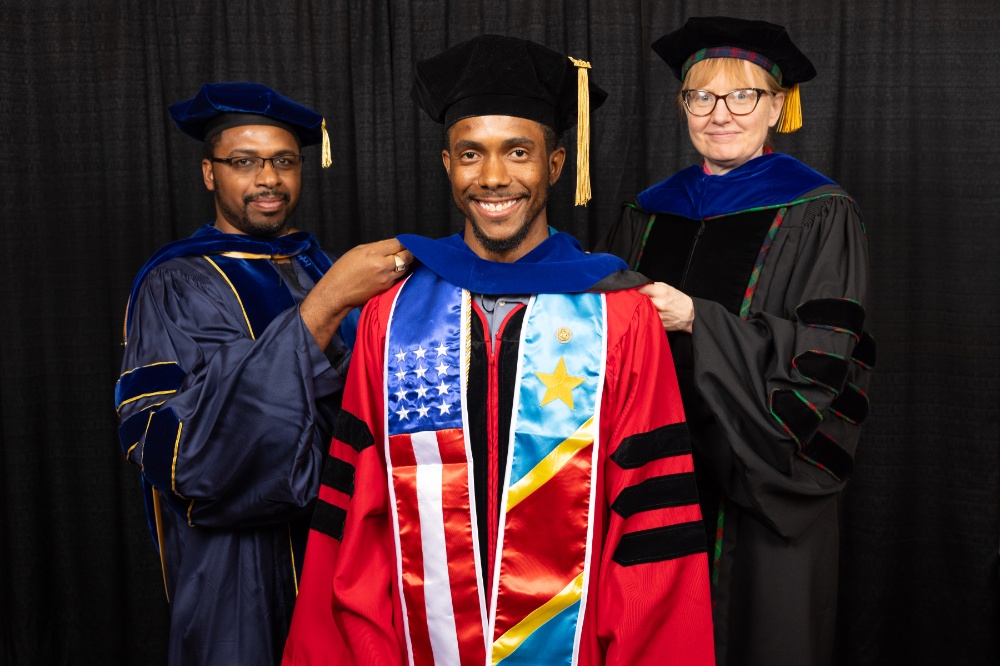News
The first College of Computing alumnus graduates with a PhD from Cornell University
September 30, 2024

Growing up, Gloire Rubambiza never imagined he would one day make history. Born and raised in central Africa in the Democratic Republic of Congo, Rubambiza’s life took an unexpected turn when, as a teenager, his family moved to Uganda amid the armed conflict in the Democratic Republic of Congo. The armed conflict is driven by ethnic tensions, rebel insurgencies, and external interventions. The conflict led to the displacement of millions, including Rubambiza’s family. For nearly three years, he and his family lived in Uganda while they went through the process to seek asylum in the United States of America. In 2012, their application was granted, and they relocated as refugees to the Greater Grand Rapids area, where they began their new journey.
Rubambiza attended Comstock Park High School, where his interest in computing, first sparked in Uganda, deepened. Comstock Park High School gave him the opportunity to attend the Kent Career Technical Center, where he explored various areas of computing and discovered his passion for computer science. This passion and interest motivated him to pursue higher education, and Grand Valley State University (GVSU), his hometown university, became the clear choice for his next step.
At GVSU, Rubambiza thrived academically and socially, becoming deeply involved in campus life. He was involved in the McNair Scholars Program, GVSU Computing Club, GVSU French Club, Black Male Scholars Initiative, and Upsilon Pi Epsilon Honor Society. In the Fall of 2015, Rubambiza applied to be a McNair Scholar. As a McNair Scholar, he was mentored by Professor Emeritus Dr. Jerry Scripps.
“I never felt as though he was trying to impress me or compete,” Scripps stated. “He could have made you feel as though he was smart but instead, when you worked with him he made you feel that you were smart.”
In the beginning of the 2016-2017 academic year, he applied for the Leadership Alliance’s Summer Research Early Identification Program where he later matched with the University of Colorado Boulder. He conducted research under the guidance of Dr. Dirk Grunwald in the Computer Systems Lab. Following his experience that summer, he worked as an intern at Collective Idea. However, in December of 2016, he faced a pivotal moment. He had to make the decision between pursuing another internship to continue down the career path or focus on research with the goal of applying for doctoral programs. He chose to continue research, driven by his desire to create societal impact through computing.
Reflecting on his academic path, Rubambiza noted, “Computing plus societal impact” fueled his passion, which drove his commitment to research and solving computing problems that affect rural areas around the globe.
Dr. Christian Trefftz, professor of computer science, stated that “Gloire has a tremendous intellectual curiosity.” That curiosity propelled Rubambiza into a new challenge after graduation in 2018. He decided to pursue a PhD at Cornell University, a prestigious Ivy League institution.
Rubambiza's PhD focused on the intersection of systems, networking, and human-computer interaction, with a particular emphasis on interdisciplinary research in digital agriculture. He was co-advised by Dr. Hakim Weatherspoon, a professor in Computer Science, and Dr. Phoebe Sengers, a professor in Information Science and Science and Technology Studies. His work aimed to address how technological advancements can drive societal impact, especially in under-resourced areas.
“We have reached what is known as the zettabyte era, which started in 2016, where we are generating more than a zettabyte of data globally each year,” Rubambiza explained. “If we took a zetta stack of dollar bills it would stretch from Earth to the sun and back 700,000 times, so how do we keep up with this data trend, especially in rural areas which face limited connectivity?”
Rubambiza's research in digital agriculture focused on converting large-scale sensor data into actionable insights for farmers, helping to improve decision-making on farms. His work also explored the concept of trilingualism—the ability to build reliable computer systems, apply them in agricultural contexts, and critically reflect on their societal impact. When he started in 2018, he was one of the few people studying digital agriculture in the US. By blending cutting-edge computing techniques with practical applications, Rubambiza's research highlighted how technology can productively transform agriculture in rural communities.
In September 2024, Rubambiza successfully defended his dissertation, making him the first GVSU computer science undergraduate to earn a PhD from Cornell University. He joins a select group of only nine GVSU alumni to earn a degree from Cornell. Rubambiza’s accomplishments pave the way for future students from the GVSU College of Computing to pursue advanced degrees at top research universities. Additionally, his journey serves as a powerful reminder to Black men that they, too, can break barriers and achieve the highest levels of academic success, showing that getting a doctorate is not just a dream but an attainable reality.
Reflecting on his journey, Rubambiza encourages current GVSU students to “get involved on campus and build a community. While the external community may not always understand what you’re going through, especially if you’re an underrepresented student in your program, it's good to have a community outside to keep your sanity. This program [computer science] is challenging, but it's great to have a community.”
As for what’s next, Dr. Rubambiza will continue as a postdoctoral associate for one-year at Cornell, under the mentorship of his PhD co-advisor, Dr. Hakim Weatherspoon. This academic year, he will return to GVSU as a distinguished speaker for the College of Computing, sharing his journey and insights with the next generation of students.
Article written by Shelby Harrison.
